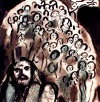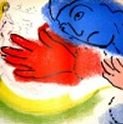|
With this week's Torah portion, the earlier narrative of the Exodus from Egypt resumes, after having been interrupted first by the Chet Ha-Egel (sin of the Golden Calf) and then later with the account of the construction of the Tabernacle (Exod. 35-40). The first part of the Book of Numbers records the census of the people at Sinai (Num. 1), the arrangement of the camp (Num. 2), the duties of the Levites (Num. 3-5), the dedication of the Tabernacle (Num. 7), and so on. However, about halfway through this week's Torah portion the Jews left Mount Sinai for the desert of Paran, and a series of sins began that led to the Sin of the Spies, the rebellion of Korach, the worship of the idol Baal Peor, and ultimately to the LORD's decree that the generation that left Egypt would die in the desert.
According to the the Talmud (Shabbat 116a), the very first sin in this chain of sins is: "They traveled from the mountain of the LORD" / וַיִּסְעוּ מֵהַר יהוה (Num. 10:33). The Ramban (Nachmanides) explains that the Jews "turned away from God with joy - like a child who runs away from school saying, 'Perhaps He will give us more commandments if we stay!'" In other words, by this time the people were eager to remove themselves from God's presence - to "run away from the Teacher" - and it was this attitude that eventually led to the series of catastrophic judgments upon Israel. The Ramban continues that were it not for this hardness of heart, God would have brought them into the Land immediately. The subsequent decree of exile for that generation was due to their unbelief (Heb. 4:6). Instead of regarding Torah as an opportunity and a privilege, the people regarded it as burden.... So significant was this lapse of faith that the soferim (scribes) noted it as a dividing point of the entire Book of Numbers (see the Seven Books of Moses). After the departure from Sinai, the people began to regularly complain and lust -- and this led to inevitable judgment... As it is written in Pirke Avot 4:2, "the reward of one mitzvah is another mitzvah, while the reward of one sin is another."
After three days journey from Sinai to the Promised Land, the people complained of their difficulties and the LORD sent fiery judgment (Num. 11:1). The Hebrew root for the word "complain" (אנן) suggests sighing, engaging in self-pity, and feeling victimized (the Greek word used in the LXX (γογγύζω) means speaking "under the breath" words of discontent, criticism, and protest). Despite personally seeing all the miracles that led to their deliverance from Egypt and witnessing the awesome revelation at Sinai, the people found fault with God's plan for their lives... The LORD was angry with the Jews for losing sight of their deliverance and for losing faith in their future. The Shekhinah Glory that surrounded the camp became a burning fire, and the outskirts of the camp were ravaged. Many people died, including the 70 original elders of Israel. Moses' prayer of intercession caused God's anger to relent, though Israel's first steps toward the Promised Land resulted in disaster and the episode was commemorated by Moses as Taverah (תַּבְעֵרָה), a "burning."

After this judgment, the "mixed multitude" or "erev rav" (Exod. 12:28) began openly lusting while the children of Israel began weeping for the "free fish" and onions of Egypt (as the Maggid of Dubno asked, how could they remember the fish and onions of Egypt but forget the plagues and miracles of redemption?) Despite the miraculous provision of manna (Exod. 16:14-31; Num 11:7-9), the people now wept for meat or "flesh" (בָּשָׂר) to eat. It is worth noting here that the midrash states that manna acquired its taste according to the gratitude of the one who ate it. For the tzaddikim (righteous ones), manna tasted wonderful, but to the reshaim (wicked and faithless ones), it tasted dry and boring.
Now the manna fell every night with the dew in exact proportion to the needs of the people, "an omer apiece according to the number of people that are in his tent" (Exod. 16:16). According to Rashi, when the people wept "family by family, every man at the door of his tent" (Num. 11:10), it was because the amount of manna that fell exposed the sin of incest. If there was an illegitimate child born, the manna would fall at the father's tent - not the mother's - revealing that an illegitimate union had occurred, and it was this that caused the weeping in Israel...
Moses was exasperated by the people's weeping because he labored under an illusion. He was under the impression that the people were complaining about the lack of meat to eat. He therefore (rhetorically) asked the LORD, "Did I conceive all this people, did I bear them, that You should say to me, 'Carry them in your bosom as a nurse carries an infant,' to the land that You have promised on oath to their fathers? How am I to give meat to all this people? (Num. 11:12-13). Moses went on to beg the LORD to do him the favor of putting him out of his misery -- by killing him (Num. 11:15).
Moses' reaction to all this seems out of character for him. After all, he had successfully interceded on behalf of the people for the dreadful sin of the Golden Calf as well as the more recent episodes at Massah and Taverah, but now when the people expressed dissatisfaction with the manna and demanded meat, he yielded to utter despair and asked the LORD to end his life. Why this reaction? Why did Moses feel so defeated in this case?
Abraham Twerski links Moses' despair with the (self)deception of the people. While the people overtly expressed discontent over their food choices, their underlying complaint was with the laws regarding intra-family marriages and incest. In other words, they disguised their real concern by blaming their problems on the menu (or on God)... Twerski speculates on Moses' frustration in this case, "I can deal with any complaint they have, provided they are forthright about it. However, if they are deceitful and do not say what it is that they want, I cannot deal with that" (On Chumash, 298). In other words, if people are unwilling to disclose what they really want, they often offer a deceptive complaint; and to the extent that they don't admit their true desire to themselves, they engage in self-deception.
The pretense of desiring "meat" led to further judgment, of course, as the LORD sent a torrent of quails from the sea to overwhelm the camp. The people went out to gather the carcasses as they did the manna, but while the meat was "between their teeth" God sent "a very great plague (מַכָּה רַבָּה מְאד) that killed all those who lusted. The place was therefore named Kivrot Ha-Ta'avah (קִבְרוֹת הַתַּאֲוָה), "the graves of lust," because they buried the people who lusted there (Num. 11:34).
Carnal lust or natural desire is a symptom of a lack of ruchaniyut (spirituality) in a person's life. "The flesh (הַבָּשָׂר) lusts against the spirit [of God]" (Gal. 5:17). Note that the word translated "lusts" here (ἐπιθυμέω) is the same Greek word used in the LXX to describe the lust of those buried at Kivrot Ha-Ta'avah. As Twerski notes, the lack of spirituality often manifests itself as a sense of pervasive discontentment with life. And as some of the sages have noted, the yetzer hara (the evil inclination) is invariably expressed as a form of restlessness that is never at peace or truly satisfied... (Boredom is the "spirit" of the flesh.) Discontentment often leads to escapism of various kinds (drugs, sex, overeating, fantasy, etc.), but when that fails to alleviate the stress (as it always does), people tend to project their dissatisfaction by blaming others or feeling victimized. To have shalom, peace, is to practice godly contentment, with acceptance and thankful surrender to God's will. Discontent is a form of ingratitude based on an entitlement mentality. It is the mode of the victim who is ready to blame others but who refuses to take responsibility for his actions. It is also self-deceptive because it disguises the real reason for the heart's dissatisfaction (i.e., the lack of authentic spirituality) by inventing other reasons for the soul's malaise. The flesh would rather die than accept the rule of the spirit, and tragically that is the case in many shattered lives in our world today...

Chaverim, let us ask the LORD to give us hearts that are full of godly contentment, which is "of great gain" (1 Tim. 6:6). May we be walking in true spirituality (רוּחָנִיּוּת) - in the power of the Holy Spirit (רוּחַ הַקּדֶש) - by practicing emotional honesty with ourselves and with God (James 5:16). Trials and tribulations - the "squeezing of grapes" - are part of the walk of faith, but we are invited to come "boldly" before the Throne of Grace (παρρησίας τῷ θρόνῳ τῆς χάριτος) to find help for our lives (Heb. 4:16). Note that the word translated "boldly" in this verse (παρρησίας) means that we can speak honestly and freely to God from the center of the chaos of our hearts -- without fear or shame. We don't need to conceal ourselves from the Divine Light, since this is the very Light that overcomes the hidden darkness within us. Those who accept that God is in complete control of their lives are set free from the terrible burdens of fear and anger. Abiding in ahavah shlemah (אַהֲבָה שְׁלֵמָה, God's "perfect love") means that you can let go...
May it please God to help us all remember: חֶרְדַּת אָדָם יִתֵּן מוֹקֵשׁ וּבוֹטֵחַ בַּיהוה יְשֻׂגָּב / "The fear of man lays a snare, but whoever trusts in the LORD is safe" (Prov. 29:25). May the LORD help us abide in ahavah shlemah, His perfect love, free from the ravages of fear and anxiety. God has promised us great comfort and help on our journey back home to Him. May we take hold of it now... Amen.
Hebrew Lesson
Proverbs 4:23 reading (click):
|





